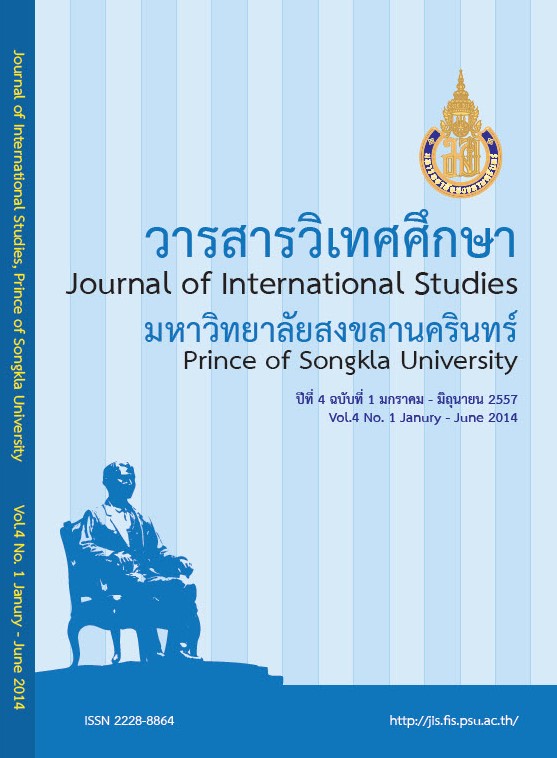Problems in Asking for Punitive Damages in the Trade Secrets Act, B.E. 2545
Main Article Content
Abstract
This qualitative research aims to study about the punitive damages according to the Trade Secrets Act, B.E. 2545. The main points are; the Trade Secrets Act applied punitive damages for the first time, which caused some problems because it was unclear about its scope of utilization. Moreover, there is no definition of the punitive damages in the Act. So, the researcher suggests that the definition of punitive damages should be added to the Trade Secrets Act, to make it clearer.
In addition, punitive damages contain some limitations; the court shall have the right to determine the compensation to punish a person only in the case that that person acts with intention or deliberation to disclose the trade secrets. For other acts, the punitive damages cannot be applied because they are too limited. If the defendant acts with intention or deliberation, trade secrets need also to be proved to have been revealed. If the defendant can prove that the trade secrets have not been disclosed, then
For the process of the case of asking for punitive damages, it is
the duty of the plaintiff to prove the error and he has to ask for
punitive damages according to the code of civil law, article 142.
Punitive damages are not the law concerning public order, if the plaintiff does not ask for punitive damages; the court will not be able to award them. The plaintiff needs to prove that the damages happened, and he suffered the result of those damages. It is the power of the court to determine the punitive damages by considering all documents and proof. The proceedings should be confidential.
compensation for punitive damages cannot be applied.
Article Details
Statements and opinions expressed in articles herein are those of the authors and do not necessarily reflect the position of the editors or publisher.
Article, information, text, image, etc. which are published in Journal of International Studies, belong to Journal of International Studies. If anybody or any organization would like to use part or whole of them, they must receive written permission from Journal of International Studies before usage.
References
กฤษณ ทองคำแท้. (2550). ปัญหาการกำหนดค่าสินไหมทดแทนในความเสียหายต่อสิทธินอก ทรัพย์สิน : ศึกษาเฉพาะกรณีค่าเสียหายเชิงลงโทษ. วิทยานิพนธ์นิติศาสตร มหาบัณฑิตมหาวิทยาลัยศรีปทุม,กรุงเทพมหานคร.
กฤษณา พิษณุโกศล. (2531). ค่าเสียหายเชิงลงโทษ. วิทยานิพนธ์นิติศาสตรมหาบัณฑิต จุฬาลงกรณ์มหาวิทยาลัย, กรุงเทพมหานคร.
คัมภีร์ แก้วเจริญ. (2526). ค่าเสียหายในคดีละเมิด. วารสารกฎหมายนิติศาสตร์ จุฬาลงกรณ์มหาวิทยาลัย, 7 (3), 25-43.
จักรพงษ์ เล็กสกุลไชย. (2528). ค่าเสียหายอันเป็นโทษในคดีละเมิด. วารสารนิติศาสตร์ธรรมศาสตร์ (4).
ไชยยศ เหมะรัชตะ. (2545). ลักษณะของกฎหมายทรัพย์สินทางปัญญา. กรุงเทพมหานคร : สำนักพิมพ์นิติธรรม.
ณัฐวุฒิ วรรณวานิช. (2538). การกำหนดค่าสินไหมทดแทนเกี่ยวกับชีวิตและร่างกายเนื่องจากการทำละเมิด. วิทยานิพนธ์นิติศาสตรมหาบัณฑิต
จุฬาลงกรณ์ มหาวิทยาลัย, กรุงเทพมหานคร.
บันเทิง สุธรรมพร. (2544). การนำสืบพิสูจน์ค่าเสียหายในคดีละเมิดสิทธิในเครื่องหมายการค้า. วิทยานิพนธ์นิติศาสตรมหาบัณฑิตจุฬาลงกรณ์
มหาวิทยาลัย, กรุงเทพมหานคร.
ประสพสุข บุญเดช. ความลับทางการค้า. วารสารกฎหมายทรัพย์สินทางปัญญาและการค้าระหว่างประเทศ (5), 1-81.
ปริญญาวัน ชมเสวก. (2550). ค่าเสียหายเชิงลงโทษในคดีละเมิด. วิทยานิพนธ์นิติศาสตร มหาบัณฑิต มหาวิทยาลัยธรรมศาสตร์.
พัลภา ชัยอาญา.(2547). การกำหนดค่าเสียหายกรณีการละเมิดสิทธิในความลับทางการค้า : วิเคราะห์บทบัญญัติมาตรา 13 พระราชบัญญัติความลับทางการค้า. วิทยานิพนธ์นิติศาสตรมหาบัณฑิต, จุฬาลงกรณ์มหาวิทยาลัย, กรุงเทมหานคร.
พีรพล ศรีสิงห์. (2536). การให้ความคุ้มครองความลับทางการค้าในประเทศไทย. วิทยานิพนธ์นิติศาสตรมหาบัณฑิตจุฬาลงกรณ์มหาวิทยาลัย,
กรุงเทพมหานคร.
เพ็ง เพ็งนิติ. (2545). คำอธิบายประมวลกฎหมายแพ่งและพาณิชย์ลักษณะละเมิด. กรุงเทพมหานคร : สำนักอบรมศึกษากฎหมายแห่งเนติบัณฑิตยสภา.
สราวุธ เบญจกุล. (2545). การกำหนดค่าเสียหายเชิงลงโทษ. รพี ‘ 45. สำนักอบรมศึกษากฎหมายแห่งเนติบัณฑิตยสภา.
สอาด หอมมณี. (2551). ก้าวใหม่ในการนำหลักค่าเสียหายในเชิงลงโทษ (Punitive Damages)มาบังคับใช้ในกฎหมายไทย. ค้นเมื่อ 10 มิถุนายน 2555, จาก http://law.east.spu.ac.th/c_labor.php.
สุทัศน์ ขำวิไล. (2549). ปัญหาการนำความลับทางการค้ามาใช้เป็นหลักประกันการชำระหนี้. วิทยานิพนธ์นิติศาสตร์มหาบัณทิต คณะนิติศาสตร์.
มหาวิทยาลัยรามคำแหง.กรุงเทพมหานคร.
สุรชัย พ่วงชูศักดิ์. (2548). ค่าเสียหายเชิงลงโทษ: การนำมาใช้ในระบบกฎหมายไทย. วิทยานิพนธ์นิติศาสตรมหาบัณฑิตมหาวิทยาลัยเกริก, กรุงเทพมหานคร.
สุรพล ไตรเวทย์. (2546). คำอธิบายพระราชบัญญัติความลับทางการค้า พ.ศ. 2545. กรุงเทพมหานคร : สำนักพิมพ์วิญญูชน.
สุพิศ ปราณีตพลกรัง. (2546). กฎหมายว่าด้วยความลับทางการค้า. กรุงเทพมหานคร : สำนักพิมพ์อินเตอร์บุคส์.
สมบัติ เดียวอิศเรศ. (2536). การกำหนดค่าเสียหายกรณีการละเมิดสิทธิในเครื่องหมายการค้า. วิทยานิพนธ์ นิติศาสตรมหาบัณฑิต จุฬาลงกรณ์มหาวิทยาลัย, กรุงเทพมหานคร.
สมเกียรติ ตั้งกิจวานิชย์, ธราธร รัตนนฤมิตรศร และ ทรงพล สงวนจิตร. (2552).การวิเคราะห์ระบบยุติธรรมทางอาญาของไทยด้วยหลักเศรษฐศาสตร์.ดุลพาห, 56 (3), กันยายน - ธันวาคม.
สอนชัย สิราริยกุล. (2543). การคุ้มครองความรู้ความชำนาญ และประสบการณ์ของลูกจ้างที่เกี่ยวพันกับความลับทางการค้าของนายจ้าง. วิทยานิพนธ์นิติศาสตรมหาบัณฑิตมหาวิทยาลัยรามคำแหง, กรุงเทพมหานคร.
ราชกิจจานุกเบกษา เล่มที่ 119 ตอนที่ 36 ก หน้าที่ 22 วันที่ 23 เมษายน 2545. ประมวลกฎหมายวิธีพิจารณาความแพ่ง.
พระราชบัญญัติจัดตั้งศาลทรัพย์สินทางปัญญาและการค้าระหว่างประเทศและ วิธีพิจารณาคดีทรัพย์สินทางปัญญาและการค้าระหว่างประเทศ พ.ศ. 2539.


